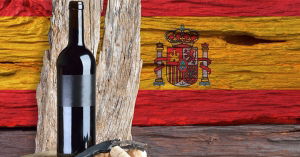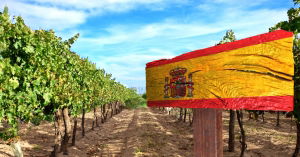BLOG
Spanish wine regions
Galicia is one of Spain’s most exciting wine regions and wine lovers are spoiled with all the options available to them. Located in Spain’s Atlantic Northwest, Galician wines are known for their freshness, with lots of crisp acidity and citrus flavors in the white wines and crunchy red fruit and floral aromas in the reds. Here are ten names to look for on your next trip to the wine shop.
Home to some of the world’s oldest productive vines – there are Albariño vines in DO Rías Baixas that have been producing grapes for over 200 years - Spain is also believed to be home to more hectares of old vines than any other country.
This article has been published in partnership with World of Fine Wine and Wine Scholar Guild.
A shocking red wine from the Jerezano new wave.
Andrew Jefford tastes 2020 Annius Atlántida Vino de la Tierra de Cádiz.
Castilla y León is one of Spain’s most significant regions and the cradle of the Catholic Monarchs, Ferdinand and Isabel. It boasts more than 60 of Spain’s heritage sites including over 500 castles, 12 cathedrals and eight UNESCO World Heritage Sites. It is also home to Vega Sicilia, one of the world’s most iconic wine brands.
Ferran Adrià’s legendary restaurant El Bulli defined modernist cuisine. The restaurant had an undeniable influence on haute cuisine trends both in Spain and across the globe. For 13 years, its wine programme was led by sommelier Ferran Centelles. Ferran continues to work with Adrià at the elBullifoundation, a creativity centre of culinary and wine-focused scholarship that was created in 2011 after the restaurant’s closure.
Over its 42-year existence as a Denominación de Origen (DO), Ribera del Duero has transformed from a relatively unknown region to one of Spain’s most prestigious wine-producing areas.
Summary
Often described as Galicia's 'second' great white grape, Godello is capable of crafting some extraordinarily complex, textural wines, with a great capacity for ageing. Currently this variety is enjoying a moment in the sun amidst a surge in popularity, particularly in its spiritual home of Valdeorras. But this hasn't always been the case - 50 years ago this variety was almost completely extinct. In this interview, Justin catches up with Galician expert Noah Chichester to
Summary
Spain has the largest area under vine of any country in the world, with around a third of vines planted prior to 1990, and centuries-old vines still producing fruit in many regions. But the last 30 years have seen many heritage vineyards grubbed up and replanted with higher yielding clones in areas that are easier to mechanize. This is added to the ongoing issue of rural depopulation, with elderly vine growers often retiring
Sherry producers like to say they deal with two types of terroir.
“First,” says Fermin Hidalgo, owner of leading Sanlúcar de Barrameda-based Bodegas Hidalgo La Gitana, “the ‘classic’ terroir we all know: climate, soil, etc. The second terroir is the one related to the wineries… Biological ageing is part of our terroir.”
Watch the Preview of the Spanish Wine Scholar Program, with Rick Fisher, Spanish Programs Director
Summary
The best wine regions never stand still, and Rioja is such an interesting clash of old meets new. Join us for this fascinating webinar from one of the world’s leading experts in the region, to understand how it’s positioned itself at the forefront of change and get to grips with the evolving landscape of modern,
Prioratans have a saying: Si ets calatà, de les pedres treuràs pa. Pero si ets a Priorati, treuràs vi. It means “The Catalan people make bread from stones, but the Prioratans make wine.” Their llicorella rock soils provide the kind of struggle that produces some of the most sought-after wines in the world. Enclosed within the Montsant Mountains, two hours from Barcelona, the Priorat is a tiny wine region whose fame is overshadowed only by the powerful beauty of its landscape.
Many wine regions in Europe like to reference their long history, typically dating the arrival of the first vineyards back to the time of the Roman legions. Viticulture in Jerez may well have an even longer history than that; it’s entirely possible that the first vines in the region were planted by the Phoenicians around the time they established the nearby port city of Cadiz in 1,110BC.
Nearly 30 years after gaining Denominación de Origen status, Galicia's most “heroic” wine region is facing some familiar challenges.
Summary:
Steep slopes and vertigo-inducing vineyards make Ribeira Sacra one of Spain's most stunning wine regions. With terraced vineyards that rival the Mosel or Douro, the region is known for its floral, austere expressions of Mencía. We'll take a deep dive into Ribeira Sacra's history and culture, and learn about why this region is producing some of the most exciting wines in Spain today. Following the presentation, a question & answer session will take place,
Watch Here
You can watch this video in our community space here
Summary
Justin tastes one of the iconic producers in the Producer Guide, this time choosing Adega Algueira's Dolio 2019 from Ribeira Sacra. Learn why it's considered a modern classic, and the inspirational role Fernando González has played
As the global popularity of Spanish wine grows, more exciting options are becoming available in restaurants and wine shops. While many people are familiar with Spain's premium red wines from regions such as Rioja and Priorat, the country also produces stellar white wines. These wonderful – and often underappreciated selections – represent a great value with excellent variety and versatility.
Like its red wines, Spain's white wines are labeled with their appellation of origin – or Denomination of Origin (DO). This designation represents the grape's place of origin, and typically each DO will specialize in one or more different wine styles made from specific grapes. For those new to Spain, knowing what to expect can be challenging if you are unfamiliar with the region.
Below is a breakdown of some of Spain's most popular (and delicious) white wines. This list includes their region of origin as well as the primary grapes from which the wines are made. Use this as a guide to expand your understanding of Spanish wine.
Spain began linking wine to “place” early on. As far back as the beginning of the 20th century, the need for wine regulations became self-evident. The country was experiencing rampant wine fraud; quality wines were being diluted with bulk wine on a regular basis.
Rioja was a leader in the charge for legislation to guarantee wine origin. In 1902, a Royal Decree defined the origin of its wines by establishing a geographical link between the name of a product and the place where it is produced. Just a little over two decades later, in 1925, the first Consejo Regulador (Regulating Council) was created in Rioja. In the years that followed, Jerez and Málaga also gained regional protection.
Are you ready to dive into one of the world’s greatest wine-producing countries? If so, our next Spanish Wine Scholar Instructor-Led course is about to start, and we would love to have you join us! If you still aren’t sure, then take a look at these ten reasons why you should be studying Spanish wine.
Galicia is magical for many reasons. Its rolling green hills and foggy river valleys make it more like its Celtic cousins Ireland and Scotland than Spain, and you’re more likely to hear bagpipes than flamenco guitar. Instead of packing sunscreen, you’d be wise to bring an umbrella. And then there’s the wine. From Albariño to Zamarrica, Galicia is home to some truly exciting grape varieties.
Page 1 of 2
- 1
- 2



















